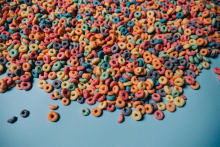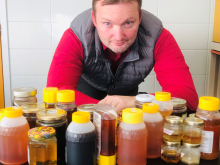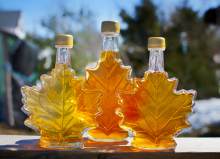An interdisciplinary team including researchers at McGill University has found a range of unexpected chemical contaminants in human milk samples from Canada and South Africa. The chemicals include traces of pesticides, antimicrobials and additives used in plastics and personal-care products. The findings were published across five papers.


Gamma irradiation, an industry-standard sterilization method for medicinal and recreational cannabis, does not fully eliminate toxic fungi or their chemical residues, a McGill University study has found. Current testing practices may also miss contamination, raising concerns about health risks for vulnerable users, particularly those with weakened immune systems.

Chemicals used to replace bisphenol A (BPA) in food packaging can trigger potentially harmful effects in human ovarian cells, according to McGill University researchers.
A new study examined several chemicals commonly used in price stickers on packaged meat, fish, cheese and produce found early signs of potential toxicity.

Dear Macdonald Campus Community,
It is with great excitement and gratitude that I begin my journey as the new Dean of the Faculty of Agricultural and Environmental Sciences and Associate Vice-President of the Macdonald Campus at McGill University. As I begin my term, I’m excited to connect with each of you - professors, lecturers, staff, learners, students, alumni, donors, and allies. Thank you for the trust you have placed in me.

In March 2025, the GEFSES program hosted its annual international symposium, "Harnessing Genome Editing for Resilient Agriculture," in Ludhiana, India. The event was held in collaboration with Punjab Agricultural University (PAU) and Guru Angad Dev Veterinary and Animal Sciences University (GADVASU).

Recently, the U.S. Food and Drug Administration announced plans to phase out some food dyes, most of which remain allowed in Canada. CBC News spoke to experts about the safety of these dyes and how they are regulated in Canada.

Mastercard Foundation Scholars Program Alumni Ibrahim Kasujja has built on his success at McGill’s Dobson Cup startup competition to help improve the school diet in his native Uganda
A Vision Rooted in Service
Ibrahim Kasujja’s journey began during the COVID-19 pandemic when he started his master's in human nutrition at McGill University remotely from Uganda.

McGill University researchers have developed an AI-powered method to verify the origin of honey, ensuring that what’s on the label matches what’s in the jar. The breakthrough offers a potential solution to a long-standing problem.
“Honey is one of the most fraud-prone commodities in global trade. It often involves mislabelling where it was produced or the types of flowers that bees collected nectar from,” said lead author Stéphane Bayen, Associate Professor and Chair of McGill’s Department of Food Science and Agricultural Chemistry.
Please join us in congratulating the 2025 winners of the Macdonald Campus Gold Key Awards, selected for their outstanding contributions, passion, and commitment to enriching student life on our campus. Read their stories below.

In the Hill Times, Saji George, Associate Professor in McGill University's Department of Food Science and Agricultural Chemistry, argues that with the right investments in research, innovation, and farmer education, Canada can lead the global transition toward a more sustainable and resilient agricultural future.
This week, Saint-Hyacinthe Technopole announced the appointment of Jade Proulx, BSc(FSc)’12, as Director of Agri-Food Innovation and Project Manager for the Saint-Hyacinthe Agri-Food Innovation Zone. Congratulations to Proulx, who has over ten years of experience in agri-food innovation—and got her start on McGill's Macdonald Campus.
McGill alumna Marie-Line Beauchamp, BSc(FSc)’82, has worked her entire life in the food industry, where she has held various management positions, including as Executive Vice President of Sodexo Canada and President of Rôtisseries St-Hubert. Since 2018, she has been the Chief Operating Officer of MTY Canada, where she oversees, among other things, the 1,106 restaurants that the group operates in Quebec.
La Presse interviewed Beauchamp about her current role at MTY, her illustrious career, and the CHUM Foundation, where she serves as President.

A number of recent food recalls across Canada have raised concerns for some about food safety and health risks. Global News interviewed Professor Jennifer Ronholm, Canada Research Chair in Agricultural Microbiology at McGill, to explain what consumers need to know and how they can stay safe.

Researchers at McGill University have developed an eco-efficient, user-friendly technology that quickly measures the antioxidant content of maple syrup. The innovative method contributes to increasing transparency about a health-related aspect of the syrup's nutritional value and allows for on-site quality testing without the need for costly lab assessments.

McGill earned its second consecutive victory in the Smart Snacks for Kids category
By Stephanie Wereley for the McGill Reporter
McGill Food Science students won first prize in the Smart Snacks for Kids category at the Institute of Food Technologists (IFT) annual expo in Chicago for their interactive pudding snack, Magic Mud Pots.
It was McGill’s second consecutive victory in that category.
